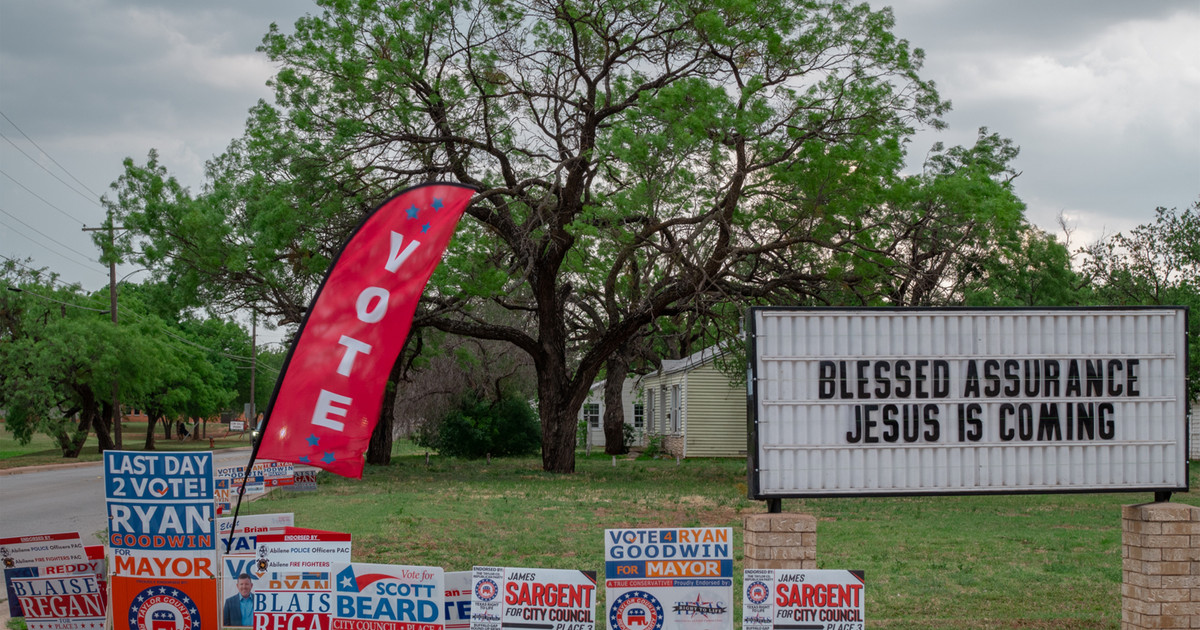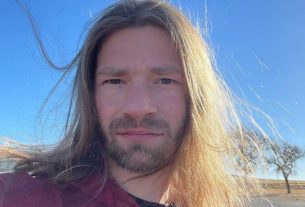This article is co-published with The Texas Tribune, a nonprofit, nonpartisan local newsroom that informs and engages with Texans. Sign up for The Brief Weekly to get up to speed on their essential coverage of Texas issues.
Voters in West Texas have decisively rejected three conservative Christian candidates who campaigned on infusing religious values into local decision making. But the support the candidates received from local churches during the race has prompted calls for state and federal investigations and triggered a local political reckoning.
“I think there should definitely be some penalties,” said Weldon Hurt, a two-term Abilene City Council member who won his race for mayor against one of the candidates. “I don’t know how severe it should be, but I think there has to be a way to curtail this from happening again,” he added. “I think there should be some discipline to these churches.”
ProPublica and The Texas Tribune reported a day before the May 6 election that three churches had donated a total of $800 to the campaign of Scott Beard, a pastor who was running for City Council. That was a clear violation of the Johnson Amendment, a law passed in 1954 by Congress prohibiting nonprofits from intervening in political campaigns. The IRS can revoke the tax exemption of violators, but there’s only one publicly known example of it doing so, nearly 30 years ago.
Beard, a senior pastor at Fountaingate Fellowship, said the donations were a mistake and that he would be returning the money. But within days after Beard’s defeat to retired Air Force Col. Brian Yates, a national group that espouses the separation of church and state demanded that the IRS revoke the churches’ tax exemptions.
“Beard is insisting that he has returned the donation checks, but his belated attempt at contrition doesn’t mitigate the initial transgressions” of the churches making the donations, the Freedom from Religion Foundation wrote in a news release. The group has sued the IRS in the past “to force it to take steps to enforce the law against tax-exempt entities from engaging in partisan politicking, and is prepared to sue again if necessary.”
Beard said via text message after the election that the money paid by the churches was intended to cover the cost of meals at one of his fundraisers. He said he returned the money and is in the process of amending his campaign finance reports.
Dewey Hall, the pastor of Fountaingate Merkel Church, which is nearly 18 miles west of Abilene and not affiliated with Beard’s church, told ProPublica and the Tribune before the election that Beard had told him that his church couldn’t give Beard’s campaign a $200 donation. Hall said he thought Beard would “be a good councilman, and we need to have Christians in politics nowadays.”
A representative of Remnant Church, which Beard reported gave him $400, responded to a question via Facebook Messenger to say that its donation was intended for Fountaingate Fellowship Church, not Beard’s campaign.
“They must have a mistake,” wrote the representative, who did not identify themselves when asked. “We will look into it.”
Neither Hall nor Remnant Church responded to additional questions after the election.
Bruce Tentzer, pastor of Hope Chapel Foursquare Church, also known as Hope 4 Life Church, said the $200 Beard’s campaign filing listed as having come from Tentzer’s church was an appreciation gift for Tentzer that he then used to pay for meals at Beard’s fundraiser for himself, another pastor and their wives.
“Obviously had I known that it would be considered a campaign contribution I would have not paid with the check. This is not some dark conspiracy,” Tentzer wrote via email. “I pray Mayor elect Weldon all the best as well as the newly elected council.”
The church donations may also violate Texas election law, which prohibits both nonprofit and for-profit corporations from making political contributions to candidates or political committees.
The Texas Ethics Commission is charged with investigating such violations and can assess a civil penalty of up to $5,000 or triple the amount at issue, whichever is greater, said J.R. Johnson, the commission’s executive director. Agency commissioners also have the authority to refer violations to local district attorneys for criminal prosecution, he said. Violations are considered third-degree felonies.
Beard has had at least two pending state ethics complaints filed against his campaign.
One comes from former Dyess Air Force Base Cmdr. Michael Bob Starr. His April 17 complaint alleges that Beard left in-kind donations from his own church, a nonprofit corporation, off his campaign finance report. Separately, on April 25, Abilene attorney Kristin Postell alleged that Beard’s campaign finance reports were incomplete, were incorrect and showed that he had accepted an anonymous donation.
“It just really bothered me that he was presenting himself as this upstanding citizen that’s going to be the moral voice of the city and has worked so hard to pass new city ordinances, yet can’t follow the rules as they exist and is lying about it,” Postell said.
Both Starr and Postell submitted their complaints to the state prior to the submission of Beard’s April 28 campaign finance report, which showed the donations by the three churches. In an interview before the election, Beard acknowledged the existence of the complaints and said “we made some errors in our reporting.”
“We’re amending those, and we’re going to resubmit them, and then we’ll just have to deal with whatever, if there’s financial penalties or whatever, we’ll just have to pay them and learn a lesson from it,” he said.
The ethics commission has not publicly announced on its website whether a violation occurred, nor has it assessed a civil penalty or made a referral to local DAs for criminal prosecution.
Both Starr and Postell said they plan to file additional state ethics complaints against Beard’s campaign for accepting donations from the churches, which are all nonprofit corporations in Texas.
Neither the IRS nor the commission would confirm or comment on any complaints.
Besides the monetary donations, at least five churches displayed campaign signs for Beard and two other Abilene candidates: Ryan Goodwin, who unsuccessfully ran for mayor against Hurt, and James Sargent, an unsuccessful City Council candidate.
The three candidates touted their involvement in an effort to get abortion outlawed in Abilene. They worked with Texas Right to Life, an anti-abortion group, and collected thousands of signatures to bring the ordinance to a vote before the council in April 2022. The council sent the matter to voters, who approved it in November 2022. Texas already prohibits most abortions, but Abilene’s ordinance goes further than state law. The ordinance, which has not been tested in court, purports to make it a crime to assist a city resident in getting an abortion, even outside of Texas, and expands who can potentially face lawsuits related to aiding or abetting a prohibited abortion.
More recently, Goodwin, an associate pastor at Mosaic Church, a small church on the outskirts of Abilene, and Sargent, a Mosaic Church member, pushed to remove books from Abilene’s public libraries that they said were obscene and harmful to children.
And all three candidates spoke about the need to prohibit family-friendly drag shows within the city limits and establish community standards as part of an effort they said would protect children. Beard said in interviews that those standards should be based on “Judeo-Christian principles” that he believes serve as the nation’s foundation.
Technically, local races are nonpartisan, but locally these were seen as a battle between social conservatives and conservatives more friendly to the business establishment.
Yates, Beard’s opponent, said it was overly simplistic to cast the election as a fight between religious conservatives and fiscal ones. He said he too is a Christian who opposes abortion. A key difference, he said, was that he and his allies don’t believe that establishing community standards is the role of government.
Hurt said he was disappointed that the local Republican Party endorsed Goodwin before the candidates got a chance to debate. At the debate, he said, he was asked what church he attended and how involved he was in it.
“Being a Christian, does that make you a better politician?” he asked in an interview. “I never used that avenue to promote myself politically. I think the time I’ve already served on council shows I’m devoted.”
The forum was meant to educate voters, said Chris Carnohan, chair of the Taylor County Republican Party, adding that churches had been “too silent and too much on the sidelines for too long” and that it was a misconception that they shouldn’t be involved in politics.
“I don’t know where that idea could ever get a foothold,” he said in an interview before the election. “They open every session of Congress in the U.S. Capitol every day with a prayer from the congressional chaplain. They do the same thing in Austin. I think they open our City Council meetings with a prayer, so what kind of crazy idea is this? You’re going to have to tear down a lot of America to get rid of the Judeo-Christian principles we were founded on.”
The local Republican Party endorsed Beard and Sargent as well. In the end, the three candidates each lost by at least 29 percentage points, according to unofficial final results.
Goodwin did not return a call seeking comment after the election, and Sargent declined a phone interview. In a text message, Sargent wrote that he disagreed with experts who have told the news organizations that churches are not legally allowed to put up political candidates’ campaign signs.
“I understand some individuals would prefer the ‘church’/church people to remain silent,” Sargent wrote. “Just because we are religious; or more specifically; Christians; it does not mean we lose our 1st Amendment rights. Pastors can and (I believe) should speak about social/political issues to inform their congregations.”
Jennifer Bell, a precinct chair for the local Republican Party, didn’t vote for the trio, because she said they were unwilling to lift the local abortion ban in cases of lethal fetal abnormalities, something doctors said her fetus had when she was pregnant in 2010.
Then, doctors gave her two options: continue to carry the fetus, which was unlikely to make it to full term, and go through a traumatic birth; or induce at 20 weeks, which would be legally considered an abortion, with medicine that could ease both her and the fetus’ suffering, she said. After praying with her husband, they made the difficult decision to do the latter.
“I think one of the most important things for a lawmaker to have is humility. I thought they would hear my story and have the humility to say, ‘Wow, we know her and she’s a good person. Maybe we should make allowances for this type of situation.’ But honestly, all I got was ‘I’m saving babies. I’m saving babies,’ and that’s honorable, but my baby couldn’t be saved,” Bell said. “I’m hoping to see the ordinance change, and I know the more of them that get into office, the less the chance of that.”
The candidates and the churches’ support of them have pushed away some like Denise Jones, who backed Yates and is leaving a church her family has attended for years because she disagreed with its pastor’s decision to give the trio of candidates the opportunity to deliver a Sunday sermon.
But others, like Diana Hartmann, a longtime Abilene resident who is active in the Republican Party, saw no problem with churches posting their campaign signs or with Beard, Goodwin and Sargent wanting to address social issues in addition to paving streets and providing water.
“I do think they have a role to play in this,” she said, referring to the City Council. “As far as I’m concerned, we have enough porno on TV and enough of that in our society today that maybe we should be making better choices that way.”
After the election, Beard returned to his pulpit and told his congregation he’d continue to look for ways to influence the city outside the four walls of his church and they should, too.
“In a world that’s grown kind of increasingly more hostile toward the church, I’m all the more motivated and really challenged to continue building here at Fountaingate a healthy and dynamic local church that not only impacts its community, but impacts its state, its nation and the nations” of the world, he said.
Powered by CityBase Screendoor.



